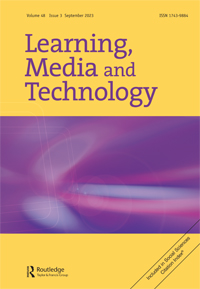(重新)将数据驱动型教育政治化:从伦理原则到激进参与
IF 3.1
1区 教育学
Q1 EDUCATION & EDUCATIONAL RESEARCH
引用次数: 3
摘要
本文探讨了数据驱动技术的伦理可能(重新)政治化的方式,特别是在涉及教育机构的情况下。近年来,伦理“AI”(人工智能)的原则、指导方针和框架在众多组织中涌现,似乎有望影响教育治理。这一趋势将首先与一种狭义的伦理形式——义务论——相一致,并忽视了伦理推理可能有助于思考“人工智能”的其他潜在方式。其次,对伦理原则的关注会被建议过度关注技术本身,从而掩盖了对公平和正义的政治关注。第三,也是最后,本文将提出一种更激进的参与伦理决策的形式,不仅挑战普遍共识的假设,而且更真实地利用教育机构固有的辩论、争论和交流能力。本文章由计算机程序翻译,如有差异,请以英文原文为准。
(Re)politicising data-driven education: from ethical principles to radical participation
ABSTRACT This paper examines ways in which the ethics of data-driven technologies might be (re)politicised, particularly where educational institutions are involved. The recent proliferation of principles, guidelines, and frameworks for ethical ‘AI’ (artificial intelligence) have emerged from a plethora of organisations in recent years, and seem poised to impact educational governance. This trend will be firstly shown to align with a narrow form of ethics - deontology - and overlook other potential ways ethical reasoning might contribute to thinking about ‘AI’. Secondly, the attention to ethical principles will be suggested to focus excessively on the technology itself, with the effect of masking political concerns for equity and justice. Thirdly and finally, the paper will propose a more radical form of participation in ethical decision-making that not only challenges the assumption of universal consensus, but also draws more authentically on the capacities for debate, contestation, and exchange inherent in the educational institution.
求助全文
通过发布文献求助,成功后即可免费获取论文全文。
去求助
来源期刊

Learning Media and Technology
EDUCATION & EDUCATIONAL RESEARCH-
CiteScore
11.40
自引率
14.50%
发文量
53
期刊介绍:
Learning, Media and Technology aims to stimulate debate on digital media, digital technology and digital cultures in education. The journal seeks to include submissions that take a critical approach towards all aspects of education and learning, digital media and digital technology - primarily from the perspective of the social sciences, humanities and arts. The journal has a long heritage in the areas of media education, media and cultural studies, film and television, communications studies, design studies and general education studies. As such, Learning, Media and Technology is not a generic ‘Ed Tech’ journal. We are not looking to publish context-free studies of individual technologies in individual institutional settings, ‘how-to’ guides for the practical use of technologies in the classroom, or speculation on the future potential of technology in education. Instead we invite submissions which build on contemporary debates such as: -The ways in which digital media interact with learning environments, educational institutions and educational cultures -The changing nature of knowledge, learning and pedagogy in the digital age -Digital media production, consumption and creativity in educational contexts -How digital media are shaping (and being shaped by) educational practices in local, national and global contexts -The social, cultural, economic and political nature of educational media and technology -The ways in which digital media in education interact with issues of democracy and equity, social justice and public good. Learning, Media and Technology analyses such questions from a global, interdisciplinary perspective in contributions of the very highest quality from scholars and practitioners in the social sciences, communication and media studies, cultural studies, philosophy, history as well as in the information and computer sciences.
 求助内容:
求助内容: 应助结果提醒方式:
应助结果提醒方式:


